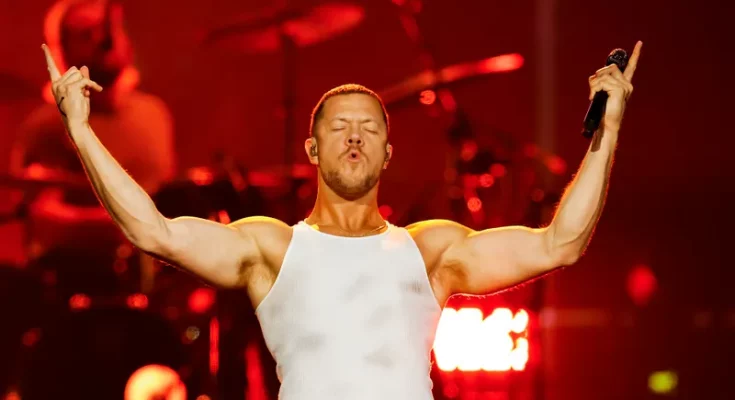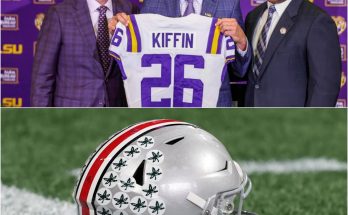Dan Reynolds has always been more than just the magnetic frontman of Imagine Dragons. Behind the thunderous choruses and stadium-shaking beats lies a man whose story is stitched together by pain, perseverance, and profound honesty. The band’s rise to global stardom wasn’t just powered by catchy hooks or sleek production — it was built on Reynolds’s raw emotional truth. Every note, every lyric, and every cry from the mic carries the weight of his inner battles and the resilience that followed.
To understand Imagine Dragons is to understand Dan Reynolds’s relentless fight with his own vulnerabilities. He grew up in Las Vegas, one of nine siblings in a devout Mormon household, where discipline and faith were cornerstones of daily life. Yet from an early age, he wrestled with emotions that didn’t fit neatly into the world around him. He struggled with depression, anxiety, and a sense of alienation — feelings he often kept buried under the surface. Music became his release valve, a space where he could say what he couldn’t articulate in conversation.
When Reynolds founded Imagine Dragons in 2008 with guitarist Wayne Sermon, bassist Ben McKee, and drummer Daniel Platzman, the band’s name itself — a coded anagram with meaning known only to them — reflected mystery and introspection. The group began by playing small gigs around Las Vegas, grinding through the uncertainty that defines every fledgling act. Yet even in those early days, Reynolds’s songwriting carried an unmistakable emotional edge. His lyrics weren’t just about love or fame; they were about survival. They reflected the internal wars waged by someone learning to live with his own darkness.
The breakthrough came with their debut album Night Visions in 2012 — a record that catapulted them from local favorite to international phenomenon. “It’s Time,” with its triumphant refrain, “I’m just the same as I was,” became an anthem for anyone struggling to stay true to themselves amid chaos. Then came “Radioactive,” a song that exploded onto charts worldwide. Its pounding drums and apocalyptic imagery felt like a rebellion against internal decay, a musical depiction of rebirth after ruin. What audiences felt — even if they couldn’t always articulate it — was authenticity. Reynolds wasn’t performing; he was confessing.
But success, rather than curing his pain, magnified it. Fame introduced new pressures, scrutiny, and isolation. Reynolds has openly shared that during this period, he faced severe depression and even contemplated leaving music altogether. He was also diagnosed with ankylosing spondylitis, a chronic autoimmune condition that causes intense pain and stiffness in the spine. For a performer who poured every ounce of energy into his shows, the diagnosis was devastating. But once again, instead of retreating, he transformed the pain into art.
Imagine Dragons’ sophomore album, Smoke + Mirrors (2015), was darker, more conflicted, and less commercially polished than its predecessor — and that was deliberate. Reynolds described it as a reflection of his own confusion, a portrait of a man caught between gratitude and guilt, hope and exhaustion. Songs like “I Bet My Life” and “Shots” revealed the fractures in his psyche — the tension between faith, fame, and self-forgiveness. Critics were divided on the album’s direction, but to Reynolds, it was a necessary evolution. It wasn’t about pleasing an audience; it was about telling the truth.
If Smoke + Mirrors was about confusion, Evolve (2017) was about rebirth. After hitting rock bottom, Reynolds began a personal transformation. He sought therapy, reconnected with his health, and found new purpose as a mental health advocate. He began speaking openly about depression, religious identity, and the stigma surrounding emotional vulnerability, especially among men. His honesty was refreshing in an industry that often thrives on illusion.
That newfound resilience bled into Imagine Dragons’ sound. Evolve was brighter, more experimental, and charged with optimism. Songs like “Believer” and “Whatever It Takes” carried the unmistakable spirit of endurance. “Pain! You made me a, you made me a believer,” Reynolds belts out in one of the band’s biggest hits — not as a metaphor but as a personal declaration. It was the sound of someone who had been broken and rebuilt stronger. The album marked a turning point, proving that Imagine Dragons could channel struggle into strength without losing emotional depth.
But Reynolds’s resilience didn’t stop with music. He turned his platform into a movement for acceptance and understanding. In 2017, he founded the LoveLoud Foundation, an organization dedicated to supporting LGBTQ+ youth, especially those from conservative or religious backgrounds who face rejection. Inspired by his own upbringing in the Mormon Church, Reynolds wanted to bridge the gap between faith and acceptance. His documentary Believer chronicled this mission, shining light on the emotional toll of exclusion and the power of compassion.
Through LoveLoud, Reynolds transformed from a rock star into a cultural advocate, showing that resilience isn’t just about enduring pain — it’s about using it to help others heal. His activism didn’t come without backlash; some accused him of betraying his faith, while others criticized him for not doing enough. Yet Reynolds remained steadfast, arguing that the fight for love and inclusion was more important than public approval. In many ways, that defiance mirrors Imagine Dragons’ music — unapologetic, emotive, and unafraid to stand out.
By the time Origins arrived in 2018, Reynolds had found a fragile peace within chaos. The album explored themes of self-discovery and reconnection with the natural world. Tracks like “Natural” and “Bad Liar” revealed a man still wrestling with his imperfections but finally embracing them. The music was atmospheric and cinematic, merging rock, pop, and electronic elements in a way that only Imagine Dragons could pull off. Each song felt like a conversation between who Reynolds was and who he was becoming.
Even as the band’s sound evolved, their identity remained rooted in the same core — resilience. That word has defined Reynolds’s journey both personally and professionally. The resilience to face illness, depression, and heartbreak. The resilience to stay true to his beliefs in a world eager to define him. And the resilience to keep creating, even when critics dismissed Imagine Dragons as “too mainstream” or “too emotional.” What many failed to realize was that their emotional intensity wasn’t a flaw; it was their foundation.
Reynolds’s openness about his struggles has also changed the way fans connect with the band. Imagine Dragons concerts have become more than just performances — they’re collective catharses. When tens of thousands of fans scream the words to “Demons” or “Whatever It Takes,” it’s not just a sing-along; it’s a shared expression of survival. Reynolds often pauses mid-show to speak directly to fans battling depression or self-doubt, reminding them that they’re not alone. In an era where mental health conversations are still often stigmatized, his vulnerability feels revolutionary.



